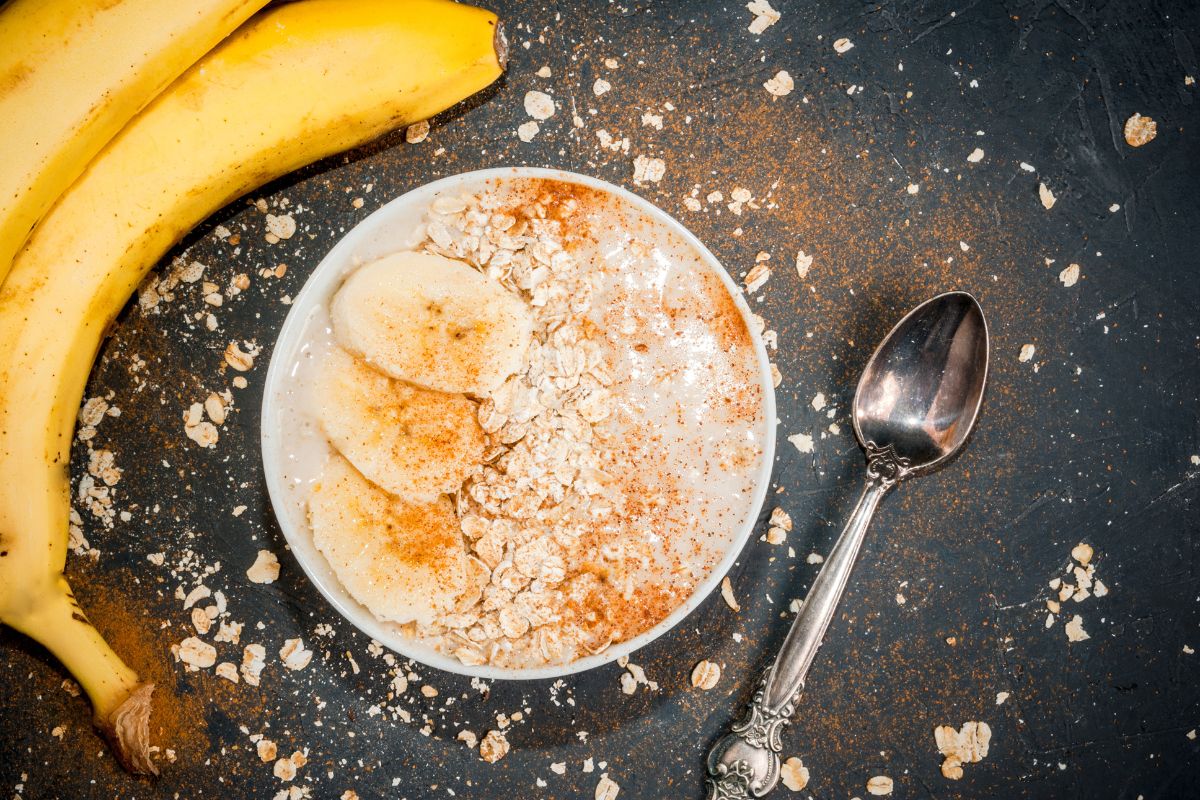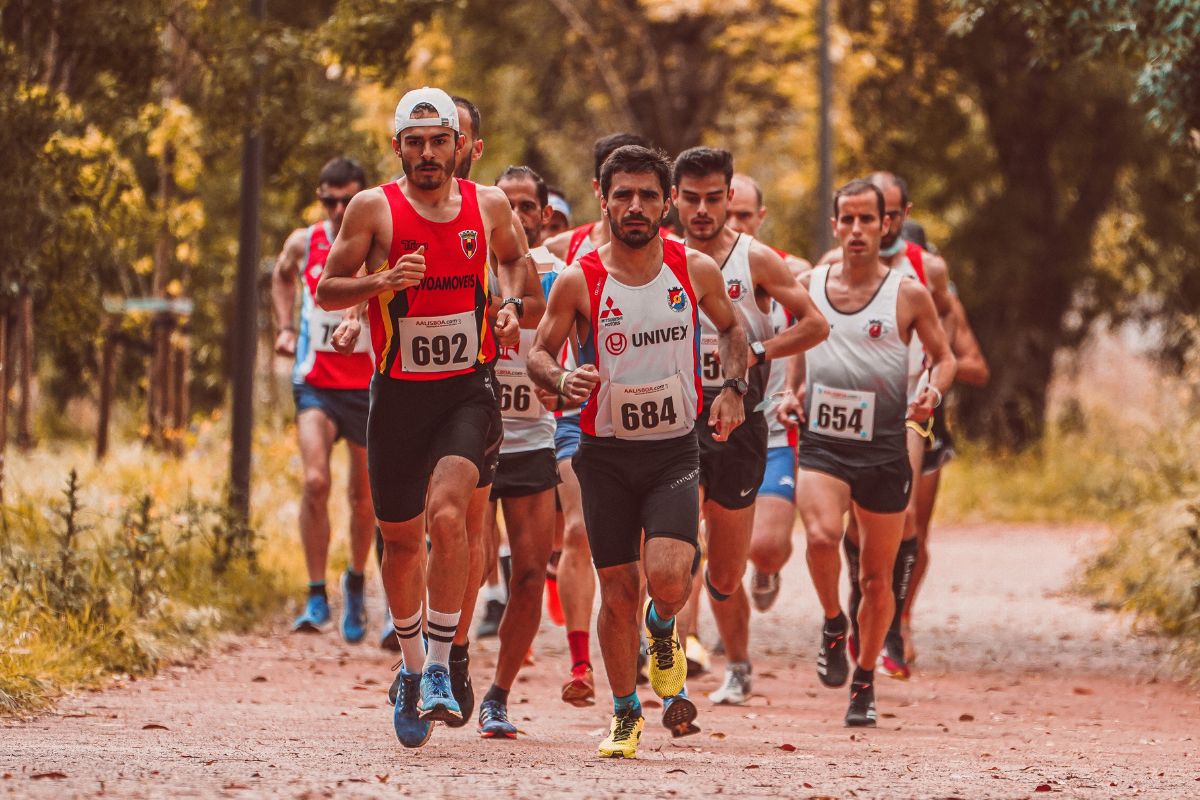Finishing a half marathon is a challenge that a lot of runners set themselves up for. While a full marathon may be considered just a step too far, the half marathon represents a feasible target.

One of the key factors is confirming your fueling and nutrition in good time and that means finding the right foods to fuel your body as it can differ for each individual.
Your training plan should be easy to follow yet finding which foods are best can be a little trickier.
In this guide, we will look at what you should eat for a pre-half marathon meal, the caffeine boost, and snacks at the start line.
We will also look at how you should hydrate before and how you should refuel during and after the half marathon.
What you should eat during the week and the day before the race will also be covered, as will how to avoid hitting the wall and why carbohydrates are so important.
The Pre-Half Marathon Meal
Most half marathons tend to start in the morning so your pre-half marathon meal is likely to be breakfast.
Try to keep it simple and maybe stick to a meal you have tried during your training plan that you know has fueled you up just right.
Good sources of carbohydrates that you are likely to have for breakfast include a banana, wholewheat bread with peanut butter, and a bowl of oatmeal.
Ensure that it has an adequate amount of calories from carbohydrates which should come from a total of between 300 and 500 calories.
That could come from a couple of pancakes, breakfast cereal, eggs on toast, a few pieces of toast, or even a simple sandwich.
For a meal that you would not normally eat for breakfast, try some brown rice and maybe some beans.
Your pre-half marathon meal should be decently sized but not too big as you will still need to digest it so opt for something with over 80 grams of carbohydrates.
Should you want to truly analyze your pre-half marathon meal then it should ideally be low in fiber, low in fat, and high in carbohydrate, with some protein thrown in.
The carbs will act as a source of fuel while little fat is included as it will slow down your digestion and impinge on that carbohydrate being turned into fuel.
After consuming the meal, you should not feel bloated or like you want to throw up as you should have some nerves but not to that extent.
How many calories you ingest in your pre-half marathon meal can also warrant some further analysis, based on your desired finish time.
Let’s say, this is your first half marathon and you want to finish but it may take over two and a half hours, you likely need around 500 to 600 calories which includes 100 to 130g of carbohydrates.
For finishing within two hours, you likely only need 200 to 300 calories, of which 40 to 70g are carbohydrates.
Elite runners who are aiming to finish inside ninety minutes likely only need 100 calories which may only be one banana, though they will need to refuel during the race considering their pace.
A Caffeine Boost Before The Half Marathon
While the pre-half marathon meal is important, so is what you drink. A cup of strong coffee or an energy drink should give you a welcome caffeine boost.
If you typically drink strong coffee or have used energy drinks during your training plan then keep at it.
The caffeine can reduce your level of perceived effort and improve your focus, alertness, and generally offer a benefit to your sports performance.
However, you want to steer away from dairy products just before a half marathon so try an Americano, Filter Coffee, or an Espresso rather than a milky coffee such as a Latte or a Flat White.

Snacks At The Start Line
Even if you have covered the half marathon distance in your training, you may still be a bit nervous at the start line. To calm your nerves, try nibbling on some dried fruit for that tidy little energy boost before you set off.
Remember that the more food you consume that close to the start may overload the stomach so be careful with it.
If you can keep down a banana, a cereal snack bar, or some rice cakes then great but try not to do something drastic and different from what you have done in training.
Get Hydrated Before You Set Off
You should drink around a half-liter of water around half an hour before the half marathon begins.
Ideally, you will know where the toilets are before you start just in case you need to empty your bladder before setting off.
Even if you feel slightly dehydrated at the start line, be aware that there will be water stations on the course, including several at the finish.
If you do need to carry some liquids then try to wear a vest so the water bottle does not affect your running form and pack some powders for that extra boost in water.
Refueling During The Half Marathon
You may believe that you have got your fueling spot on before the half marathon but depending on the conditions, you may need a little refueling.
This could be easily done with some gels that are really easy to carry with you.
Energy gels are another feature of your training plan that you should be accustomed to if you are going to try them on race day.
If they work and you know when to take them then great yet if the race is the first time you try them then tread carefully.
First, you need to check that you can carry them while you run comfortably. That could be in an arm strap or a fuel belt and you may need a couple to get you through the full distance.
Isotonic gels are likely ideal as you can just take them without having to find a water station and then stop as you mix in the gel.
Do not forget to take the packaging with you too or find a garbage can to deposit it in.
How To Avoid Hitting The Wall
Hitting the wall is one of those things that many runners fear, especially on race day.
That uneasy, uncomfortable feeling when it seems that your body is running out of fuel.
Running an especially long distance such as a half marathon can result in depleting your body’s store of glycogen with a lot of that being in your muscles.
hat’s when the weariness in your legs starts to creep in as your body struggles to keep them moving.
To avoid that feeling, and to avoid hitting the wall, make sure that you have some energy in reserve.
This will be in the form of calories from carbohydrates you consume during the race so take some snacks such as dried fruit or chews with you for that quick energy boost before the weariness creeps in.
This may not be a practice you opt for during your training plan as experience with the wall may only be factored into runs that are over 90 minutes long.
If you were looking to pre-empt hitting the wall then try to each an energy chew, gel, or drink a sports drink roughly every half an hour to 45 minutes.
That should replenish your energy stocks so that you never get close to hitting the wall.
Try to work out which snacks and how far into the race you should take them when you complete the distance in your training.
It may be the case that gels and jelly beans simply are not for you while dried fruit is.

The Meal The Night Before
Your last supper before a half marathon is a crucial meal. Try not to overthink or overdo it as you do not want to be stressed before bed as it could signal a restless night.
Keep it simple with some meat such as grilled chicken or fish with some carb-rich vegetables and it may be a meal that you have gotten used to in the final weeks of your training.
Though you may be tempted, forgo the steak as this could be a particularly difficult meal to digest the night before and the nutrients are actually better placed to act as a reward after a long-distance run.
Eat the meal relatively early to give your body time to digest it.
You do not want to overdo it so keep the portion small but not too much as you want to wake up slightly hungry to then replenish with some easily digestible snacks.
If your meal the night before is too heavy then you may struggle to fully digest it.
A bowl of pasta should be easy to digest and avoids any huge pieces of meat where the protein may seem overwhelming.
What you drink with this final meal is also important as hydration is key. Avoid any alcohol, even if you think it will relax you before bedtime.
The substance will alter your hydration and affect your sleep cycle when you need as much rest as you can get.
Think about enjoying a nice, cold alcoholic beverage after the race and it should serve as a much-deserved reward.
The Day Before
Yes, the meal you have the night before is important but so is what you take in for the full day.
Try to stick to how you’ve been eating during the training plan as you do not want to do anything drastic that upsets your stomach and digestive system.
As a basic rule, do not overeat as that is likely to stress your body which is the last thing you want yet also avoid alcohol and caffeine.
Stick to four meals which include breakfast, lunch, and dinner, as well as a snack during the mid-morning.
Fueling The Week Before A Half Marathon
For the final week before a half marathon, you should cut out fruits and vegetables. This may sound like a challenge itself yet it is for the best.
Try to add more complex carbohydrates in the form of potatoes to your meals as these will also be rich in nutrients.
Even sweet potatoes are a good option as they have a tiny amount less fiber than a regular potato.
Try not to increase your daily amount of calories as you want to keep your fuel intake up.
However, the simple task is to replace your fruits and vegetables with heavier, carb-rich foods to act as fuel for the run.
You want to ensure that your final day of eating fruits and vegetables is three days before the half marathon.
So if the race is on Sunday then the final day for fruits and vegetables will be Thursday.
There is some science that goes behind how much you should stock up on carbohydrates the week before a half marathon.
The equation is that around 4g of carbohydrates should be consumed for every pound of body weight.
That’s every day so if you are a 100-pound runner then you should be opting for 400g of carbohydrates in your daily intake.
It can be difficult to keep track of your carbohydrate consumption so it is worth splitting it into meals that you recognize, though with a few more carbs added.
For instance, if you are used to oatmeal to start your day then throw in some fruits too.
Snacks are also important so at mid-morning you could have a toasted bagel, maybe with some ham.
Pasta is an ideal lunch meal, especially with vegetables and a basic oil dressing then for dinner you can have some fish with a sweet potato.
While a cup of coffee or an energy drink provides a caffeine boost you may enjoy at the start line, you should prioritize sleep the week before a half marathon.
That means cutting out caffeine and also alcohol so your body is well-rested and detoxed before the race.

How Important Carbohydrates Are For Race Preparation
There may be a part of race preparation that runners actually enjoy which is the carb-loading phase.
This is due to the fact that carbohydrates can quickly be converted into energy that fuels your body, they are often readily available too.
The harder you run, the more energy will come from those stored carbohydrates so it is important to build up your supply.
The carbohydrates are kept in your liver and muscles before becoming energy and once the energy (or glycogen) stores are used up, the body will try to convert fat for its energy requirements.
Using fat for energy is less efficient than using carbohydrates which is usually the point when runners hit the wall as the body struggles to convert the fat.
Stock up on carbs and this should not be a problem, especially if you replenish those stocks during the race.
Final Thoughts
Though fueling before a half marathon is important, try not to overdo it.
Yes, you should get in some carbs but having a huge meal that you struggle to digest could take away your focus from the rest of your preparation.
Keep to what you have been doing in your training preparation which includes the meals.
Avoid caffeine and alcohol in the week before but remember that if you feel weary during the race it is best to take some snacks with you for that boost of energy.
Frequently Asked Questions
How Much Time Should I Give For My Pre-Half Marathon Meal?
The time you give your body to digest your pre-half marathon meal largely depends on how laden in calories the meal is.
For lighter meals that contain at least 300 calories but less than around 500 calories, you should give about two hours.
Bigger meals such as those that have up to 1000 calories may need a full four hours to digest.
For a half-marathon in the morning, this duration may prove problematic. If the race starts at 9 in the morning then eating a heavy meal at 5am will likely disrupt your sleep pattern.
The safer option is to go with a lighter meal to give you more time so you can eat it at a more reasonable time.
Sleep should be an important consideration so think about fueling midway through your race.
What Foods Should I Eat To Recover After A Half Marathon?
If you have been carb-loading in preparation for the half marathon you can start to cut out the carbs from your meals.
Try to balance your plate with some more vegetables and you can certainly eat more fruit.
If you want a tangible reward for completing the half marathon distance then enjoy that cheat meal you promised yourself.
This could be a huge ice cream sundae or a huge pizza with a mountain of cheese.
You will likely be sweaty, tired, and maybe exhilarated too that you conquered the long-distance and completed the challenge that you set out to achieve.
Recovery is key so make sure you rehydrate with some water and take in that big meal to replenish your body.
- Can Dogs Run Faster Than Humans? (Running With Your Furry Friend) - October 4, 2022
- 10 Doggie Fun Runs You Will Love [Ultimate Guide] - October 4, 2022
- What Are Division Results In Running? - October 4, 2022








